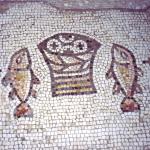During my first few years as a priest, I would travel about one hour twice per month to Macon State Prison to hear confessions and celebrate Mass. This was a high security prison between Montezuma and Americus, Georgia, and many of the inmates were young “lifers” who knew they would die in prison.
I would get 15 faithful for Mass on a good evening, and about half of them were Catholic. Some would come simply because the common room where Mass was held was air conditioned, and their cells were not. They totally came for the wrong reason, but they were there, were respectful and participated.
One evening as I waited for the guys to come after count, the chaplain aid told me to get ready because about fifty men were coming to Mass. I asked him how come and he said, “well Father, a guard got stabbed this morning in the eye, so all these folks are coming to get some information.” The aid continued, “they don’t know who did it, but I don’t understand, if he got stabbed in the eye, the guard should’ve seen who came for him!”
I must confess that I got a little nervous, and I had never felt nervous in the prison before. A bit later, the room was filled with almost 70 inmates, sitting scattered across the room. I modified my homily aware that my audience was quite different than the usual 15.
At one point, as I walked among the guys, I asked them to imagine what the prison would be like if everyone in there truly looked for the good of others. If every heart turned to Christ. Some young men in the back sat with their arms crossed, looking at my suspiciously, and shaking their heads. I walked up to them and said, “come on, do it for me, allow yourself to imagine what it would be like.”
Mass ended and there was no incident. The men hung around afterwards, I chatted with several of the newcomers who were grateful for having come. I pray that the seeds planted that evening grew and became fruitful.
In today’s Gospel passage, Jesus sounds aggravated because people are following him for the wrong reason: “you are looking for me not because you saw signs but because you ate the loaves and were filled. Do not work for food that perishes but for the food that endures for eternal life.” The same villagers who were present at the multiplication of the loaves and fish keep chasing after him looking for another sign or “magic trick.” They follow after him because they had eaten and had their fill, not for a deeper reason. Despite their misplaced intentions, and Jesus’ rebuke, the people follow him.
The people ask Jesus, “what sign can you do, that we may see and believe in you?”
He already fed them! He already healed people! What else can he do? What do these people want? I think Jesus gets quite frustrated with the crowd because they just don’t get it.
My story of the prison and the passage we heard today serve as hopeful reminders: Jesus can work with our defects and sometimes imperfect intentions. He can squeeze good out of us even when we struggle to understand or fail to get everything in our lives straightened out.
Pope Francis wrote some time ago that when a soldier wounded in war is brought to a field hospital, you do not worry about his high cholesterol level or the cavities in his teeth: you go for big issues: apply pressure to the wound, take out the bullet, stitch him up. Other things can come later.
When someone approaches God carrying within the many wounds received in life, God embraces the person, and begins to walk with him or her. Little by little, there will be healing, there will be a deepening of faith, there will be a conversion.
Some days it may feel that coming to Mass is mechanical; other days it may be difficult to show the love we have for family members; maybe at work we may say something or do something because we know it will help us, rather than doing it for the good of the other. We all struggle at times with the sincerity of our intentions, and we can work to purify these. Jesus teaches us however that even with skewed intentions, He can bring about a fruitful harvest.
Jesus is patient with us, and his divine patience is directed at our salvation. He is patient with us because he wants us to turn away from our wrongdoings and to choose Him.
God is a master of writing straight with crooked lines. Those times that we do not fully understand, those days that we feel frustrated because we find ourselves with the same struggles, the moments when things do not go the way we hoped, we trust ever more, that Jesus is there to redeem every moment, especially our mistakes. May Jesus purify the intentions of everything we do, that we may always act to praise God and to love our neighbor.
Picture from here.
Eighteenth Sunday of Ordinary Time













